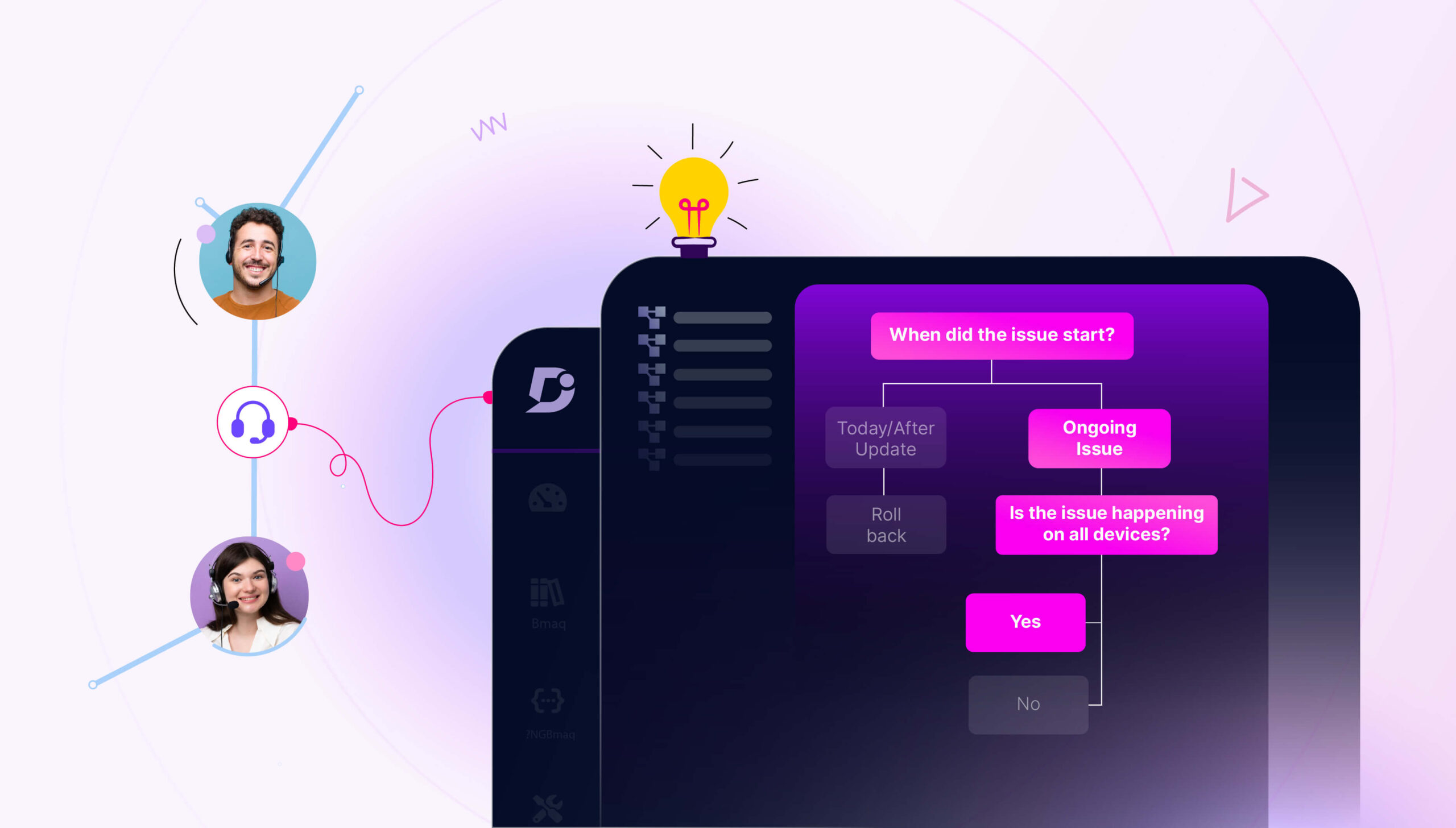It should come as no surprise that customer service plays a key role in almost everything you do. Your customers are your revenue and what keeps your business afloat, so it makes sense to give them everything they want from you and more. In fact, it goes without saying that those businesses who don’t show their customers the respect they’re looking for will quickly lose out and suffer as a result.
A continually negative customer service experience can fundamentally undermine a business, irrespective of how wonderful the product/service actually is. There’s only so much modern consumers will accept from a company before they choose to jump ship, even if it means finding a more expensive or even inferior offering.
What is Customer Service?
Customer service is crucial to driving business growth through its role in retaining loyal customers. Companies leading in customer experience showed compound average revenue growth of 17% over a period of five years, compared to other companies who saw only 3% growth.
Customer service roles are also gaining more status and have excellent career prospects. This is partly due to the fact that services are becoming more complex, technical, and customers are expecting more. With many competing products, exemplary customer service makes your business stand out. This also means customer service should be part of everyone’s role.
Why Customer Service Skills are critical to your business success
While customer service skills have always been an essential part of good business operations, their importance to short and long-term business success is growing rapidly.
Competition is increasing
Your business has always been up against competitors, but as the global market develops and becomes increasingly connected, the number of companies you’ll be competing against is rising too. This jump in competition means it’s not only harder to get new customers through the door, but also means there are more alternatives should your consumer base be dissatisfied.
With so many options at the touch of a button, the opportunity for customers to spend their money elsewhere is greater than ever, so the experience you deliver needs to be as good as possible.
With this in mind, customer service skills are essential, as they often play a large part in the experience your customers have with your product/service – particularly when things go wrong.
Customers are louder than ever and will make bad experiences public.
In 2022, a dissatisfied customer is a dangerous customer. Armed with the power of social media in the palm of their hand, your customers have everything they need to tell the world about your performance, particularly when it’s bad. The modern customer regularly shares negative experiences with friends, family and the wider world, and this can quickly snowball into a full-blown negative reputation if it occurs too often.
Strong customer service skills help to avoid these incidents, even when things go wrong. Whether it’s just helping customers make the most of the offering, or ensuring they’re cared for in the event of an error, customer service is critical to minimising negativity and maximising the customer experience. The faster and better a problem can be solved, the lower the chance negative sentiment will be shared in the public domain – protecting your reputation and future opportunities.
Customer expectations are growing
As customers become more global, they’re exposed to greater levels of opportunity and potential, this makes them aware of what can be achieved and in many cases, raises expectations. The customer of 2022 wants more for less and they’re seeing companies deliver on a daily basis – Netflix and Spotify are both great examples. Whether expectations are realistic or not, customers are holding the companies they use and engage with to higher account, and so it’s essential competitive businesses rise to this challenge, or face the consequences of delivering disappointment.
With good customer service skills supporting your business, you can meet and even exceed the expectations of your customers. This not only drives return custom but elevates your brand and satisfies your customers view of your company and its offerings.
Customers want to help themselves
Good customer service skills don’t just come in the form of a person engaging with another person, they also come from providing the right solutions so your customers can get what they need on their own. This may come in the form of a FAQ page or even a full-blown knowledge base like Document360, your customers want to find the information that will help solve their problems and you want to minimise the human resources to satisfy your customers. A knowledge base software helps achieve both goals and moving into the future will only grow in importance as consumers look to help themselves more than ever.
Find out how Document360 can help you to reduce support tickets!
Book A Demo
10 customer service skills that drive business growth
We want to really drill down into the core customer service skills that everyone in your company should be developing.
1. Empathy
Empathy is one of the most well-known customer service skills out there – but do you know what having empathy really means?
“Empathy is about finding echoes of another person in yourself,” says Mohsin Hamid. It’s a beautiful quote, but scientifically speaking there are two types of empathy you need to cultivate in customer service. These are affective empathy and cognitive empathy.
Cognitive empathy is being able to imagine what your customers are thinking and see things from their perspective. This skill is crucial to handling difficult problems and successfully helping customers. Affective empathy is feeling the emotions of others, and you need both to truly connect with people.
2. Emotional control
While it’s important to have empathy and be in tune with your emotions, you also need to be able to control those emotions effectively. Shorthand for emotional intelligence is EQ. Emotional control is a subset of EQ, and it plays an important role in successful social interactions.
Emotional control is when a person manages the generation, experience, or expression of their emotions, and also their own emotional responses to the emotions of others. It means we don’t lose control when we feel frustrated and start shouting abuse at customers.
We can choose how and when we express our emotions, giving us the ability to guide a social interaction towards a desired outcome. That doesn’t mean you should take abuse from customers, but you should be in control of adapting your response to any given situation.
3. Projecting warmth
Projecting warmth is the ability to make customers feel like you care about them and put them at ease, and it’s strongly predictive of purchase intent. If your prospective customers are thinking about buying your products and they reach out to customer service, they should feel they get a warm response. But what does this actually mean?
Social psychologists call it the warmth and competency model and it goes beyond the idea of “smile more”. Our unconscious ability to pick up on the warmth and competence of others determines up to 82% of our overall judgments about that person.
Warmth is defined as showing trustworthiness, friendliness, helpfulness and sincerity. You can train your agents to show these traits by being accurate in your customer service, smiling and remembering your customers, going the extra mile to help your customers, and living up to your values.
You project warmth partly with your tone of voice, but also with body language and how you dress. Warmth is conveyed differently over digital channels compared to face-to-face or over the phone. If you’re communicating with text only through email or live chat, make sure your written communication is warm and friendly using the odd exclamation mark, and even emoji.
4. Active listening
Listening to your customers is an important skill, and one that all customer service agents know well. But do you know how to apply the two distinct types of listening to your customer service?
“To learn through listening, practice it naively and actively. Naively means that you listen openly, ready to learn something, as opposed to listening defensively, ready to rebut. Listening actively means you acknowledge what you heard and act accordingly,” says Betsy Sanders, former Senior Vice President of Nordstrom.
Naive listening is the opposite of defensive listening, because you listen openly without focusing on your own intentions, while defensive listening is using the time when they speak to form a counter-response. Active listening means you feed back to the other person what you’ve heard them say to show you understand.
We’re all prone to cognitive bias, where we distort reality to fit our beliefs and ideas about the world. It’s our way of conserving attention, since we don’t need to pay attention to every little detail.
This evolutionary habit means we may end up missing important details about others. For example, we might assume a customer is struggling to understand the product, rather than seeing that there genuinely are technical problems with your software. This is huge, because unhappy customers are likely to churn, and then complain about you to 9–15 of their friends.
Practice naive listening by consciously emptying your mind the next time someone speaks to you. Wait until they have definitely finished speaking before you respond, and rephrase what you heard them say back to them to show that you understand.
An intuitive knowledge base software to easily add your content and integrate it with any application. Give Document360 a try!
GET STARTED
5. Product knowledge
Customer service agents are the product experts. You are responsible for selling its use cases and benefits to existing customers.
Salespeople are often billed as the product experts, but nurturing repeat customers is crucial for SaaS businesses. In these types of businesses, the line between sales and customer service is blurry, and customer support agents often find themselves in the position of recommending services.
“Know what your customers want most and what your company does best. Focus on where those two meet,” says Kevin Stirtz, which is excellent advice for customer service agents.
You must be inclined to study your products and services with a level of attention to detail unknown to most people. Make it a goal to spend at least half an hour studying the product every day. Agree this with your manager so you can have dedicated time off from tackling frontline problems.
Develop your understanding of whatever product you’re supporting, research your own product and its competitors in depth, and be able to explain its potential for use in a variety of different situations. Being ready to recommend new features or plans will help you turn problems into an opportunity for impressing your customers.
6. Troubleshooting
If you’re working in customer service, you will be solving problems all day. You need to become very good at diagnosing a problem, choosing a course of action, and following it through to the end. Then rinse and repeat. These are your troubleshooting or problem-solving skills.
To make matters more difficult, you often have to tackle problems where you don’t have access to the customers’ product or service. Or, you are troubleshooting on behalf of someone else and may not have the full range of information. Sometimes customers will be angry at you right from the start.
Asking your customers the right questions and eliminating possibilities is key. You also need to think about the overall context of the problem, and whether it is unique to one customer or could be a system-wide problem.
Often the key to great troubleshooting is experience, and never give up – even when the situation feels impossible to resolve.
7. Situational Awareness
One skill that will help you get better at troubleshooting is the habit of Situational Awareness. This is a concept used in tactical combat, and it plays a key role in enabling individuals to make appropriate decisions in dangerous situations.
In a customer service role, it’s rare that you will find yourself in any real physical danger. But being able to read a situation quickly and decide what to do is crucial for keeping customers happy – and ensuring they don’t quit your business.
8. Patience
We all know that we need to have patience, but it’s not just about waiting passively for something to happen. It’s an active, mindful state we can all cultivate more in our lives. Patience is the ability to deliberately wait until the right moment to make your move – knowing that timing is often everything.
Unfortunately, many parts of being in a customer service role can be tedious and test our patience – especially if you’re hearing the same problems every single day. It’s tempting to rush through the job, and focus on targets instead of helping people.
Having patience means resisting the urge to rush towards a resolution, and instead accepting the natural flow of events as they happen. Exercising patience is how you create true customer satisfaction and loyalty.
9. Clear language
Customer service pros are masters at using clear language to get their point across.
Your ability to clearly communicate your point is crucial, and this is especially true for email and chat where a lack of tone can create ambiguity. There must be no room for interpretation in your writing since there is very little feedback from the customer. If they can’t understand your questions or instructions then they won’t be able to fix their problems. Clear communication reduces customer effort and drives their loyalty.
There are no set rules for clear language since it all depends on your audience – each communication should be tailored for the individual. Your writing skills should be honed to the point where you can easily and clearly communicate your point so that someone else can understand it. This means being able to empathise with your customer and put yourself in their shoes.
When you write your next email, read it back to yourself to check that the meaning is clear. Edit it like you would a professional document, and restructure it so it flows better. Remove any words that are difficult to understand, and replace them with simpler words.
Find out how Document360 can help you to reduce support tickets!
Book A Demo
10. Confidence
It may seem obvious, but customer service agents need build their confidence in order to be successful in their role.
Confidence is more about how you make other people feel, rather than how you feel inside. It involves outwardly projecting the fact that you believe in yourself, while at the same time being relaxed and humble so you don’t come across as arrogant.
“At the time your customer is most insecure, is the time you need your front line most confident,” says Chip Bell, Keynote Speaker & Author, of The Chip Bell Group.
A confident employee puts customers at ease, and assures them that they can fix the problem – or at the very least find someone who will. Confidence is also infectious. It can come from experience, but you can also make the effort to learn to be more confident.
Try something new that lies just outside your comfort zone to give you a quick confidence boost. Talk to a person you might like to befriend, wear that daring outfit, or try a new sports activity. Make facing your fears a habit, to develop your confidence over time.
And when speaking to customers, make the effort to sound more authoritative (while at the same time respectful). Take control of the situation – don’t expect customers to tell you how to fix their own problems.
How good customer service skills impact your bottom line?
Great customer service skills generate word of mouth promotion
It may be obvious, but in the modern world, word of mouth is everything. With more choices than ever and performance data at their fingertips, the modern customer is increasingly looking for strong indicators of quality, before buying. This includes everything, from the product quality and the brand, to the customer service experience, it will all be judged accordingly and has major potential to influence future business.
By offering a consistent high-quality customer service experience, you can turn your customers into brand advocates that do your marketing for you. Just think about how much you spend on awareness, education and conversion..now imagine your customers doing all that voluntarily for you. That’s what good customer service can do.
A great customer service experience drives repeat custom
Customer loyalty is hard to build, but with great customer service skills, you lay a fantastic foundation to create a regular return customer. By offering a high-quality customer service experience, you can develop connections with your customers that show you not only care about their problems but are actively prepared to dedicate resources to finding solutions.
This commitment is often highly appreciated and in many cases, drives repeat custom. Once a consumer has had a good customer experience, it’s likely they’ll return looking for it again, and be much more open to engaging with your company if you have what they need.
High-Quality Customer Service skills unlock up-sell opportunities
A happy customer is an opportunity. Chances are if your customer enjoyed their first experience engaging with your brand and your products/services, they’re likely to be much more open-minded to purchasing further offerings. Customer service skills play a key role in this opportunity as it’s often the communication between customer service and customer that unlocks the potential for upselling. During these communications, the customer’s problems and challenges become that much clearer and it may actually be in their interest to investigate additional solutions to reduce their stress.
Conclusion
Customer service is one of the most varied roles out there, with useful skills to develop ranging from more empathy and active listening, to organisational abilities and clear communication.
It’s a lifelong journey of learning, but you can start today to improve your skills in helping customers. “Customer service is an attitude – not a department,” says Mo Hardy. Good customer service means putting customers at the heart of everything you do as a company.
Customer service is everyone’s job – not only those working in the customer service department. We can all benefit from increasing these customer-focused skills, since customers are the lifeblood of every business.
An intuitive knowledge base software to easily add your content and integrate it with any application. Give Document360 a try!
GET STARTED




 –
– 

